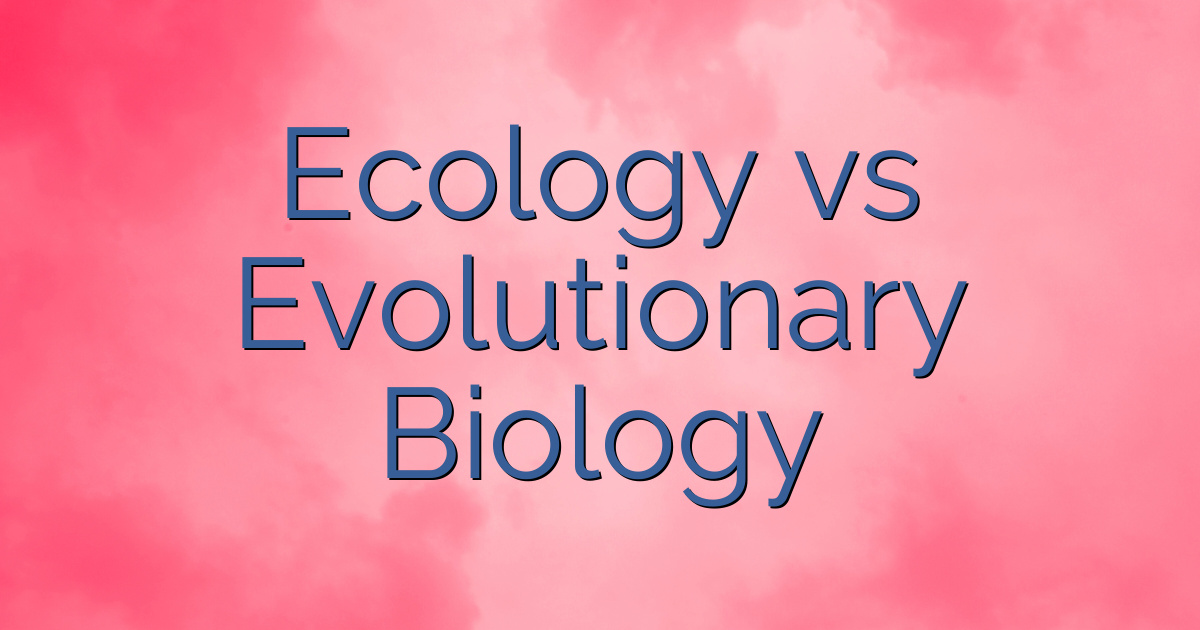 Are you torn between studying Ecology and Evolutionary Biology? You’re not alone. Many students find themselves grappling with this decision.
But fear not, this article will provide you with all the information you need to make an informed choice. From an overview of the curriculum and requirements, to a comparison of skills developed and career opportunities, we’ve got you covered.
So, let’s dive in and explore the fascinating world of Ecology vs. Evolutionary Biology.
Are you torn between studying Ecology and Evolutionary Biology? You’re not alone. Many students find themselves grappling with this decision.
But fear not, this article will provide you with all the information you need to make an informed choice. From an overview of the curriculum and requirements, to a comparison of skills developed and career opportunities, we’ve got you covered.
So, let’s dive in and explore the fascinating world of Ecology vs. Evolutionary Biology.
Table of Contents
Key Takeaways – Ecology vs Evolutionary Biology
- Ecology and evolutionary biology are two distinct majors that study different aspects of the relationship between organisms and their environment.
- Both majors offer valuable skills and knowledge with real-world applications, and provide research opportunities for further scientific knowledge.
- The curriculum and requirements for both majors focus on understanding ecosystems, genetic variation, and mechanisms of adaptation.
- Both majors develop skills in statistical analysis, but with different focuses: ecologists analyze biodiversity and population dynamics, while evolutionary biologists analyze genetic diversity and factors driving evolution.
Overview of the two majors: Ecology and Evolutionary Biology
Ecology and evolutionary biology are two distinct but interconnected disciplines. As a student interested in these fields, you’ll find numerous research opportunities and exciting prospects for graduate school. In ecology, you’ll study the relationships between organisms and their environment. This could involve investigating how species interact, understanding the impact of human activities on ecosystems, or exploring conservation strategies. Evolutionary biology, on the other hand, focuses on the processes that drive the diversity of life over time. You may delve into topics such as natural selection, adaptation, and speciation. Both disciplines rely on fieldwork, laboratory experiments, and data analysis to answer research questions. These experiences will not only enrich your understanding of the natural world but also prepare you for advanced degrees and careers in academia, conservation, or environmental consulting.Overview of the curriculum and requirements of the two majors
When deciding between the two majors, you’ll need to understand the curriculum and requirements for both. In terms of practical applications and real-world implications, both ecology and evolutionary biology offer valuable skills and knowledge. Ecology focuses on the relationships between organisms and their environment, with an emphasis on understanding ecosystems and how they function. This major prepares you for careers in environmental consulting, conservation, and resource management. On the other hand, evolutionary biology explores the processes that drive genetic variation and the mechanisms of adaptation. This major opens doors to careers in fields such as genetics, medicine, and biotechnology. Both majors also provide research opportunities, allowing students to gain hands-on experience and contribute to the advancement of scientific knowledge. Ultimately, the choice between ecology and evolutionary biology depends on your specific interests and career goals.Overview of coursework, assessments, and fieldwork opportunities
To get a well-rounded education in either major, you’ll have the opportunity to engage in a variety of coursework, assessments, and fieldwork experiences. Here’s what you can expect:- Coursework: You’ll delve into topics like population genetics, community ecology, and evolutionary theory. These courses will provide you with a strong foundation in both ecology and evolutionary biology.
- Assessments: You’ll be evaluated through a combination of exams, research papers, and presentations. These assessments will test your understanding of key concepts and your ability to apply them to real-world scenarios.
- Fieldwork: Both majors place a strong emphasis on hands-on experience. You’ll have the chance to conduct field research using a range of techniques, such as transect surveys and mark-recapture methods. This fieldwork will allow you to apply your knowledge in a practical setting and develop essential skills for a career in ecology or evolutionary biology.
- Statistical Analysis in Ecology: You’ll also learn how to analyze ecological data using statistical methods. This will enable you to draw meaningful conclusions from your research and contribute to the broader understanding of ecological processes.
Comparison of Skills Developed in Ecology Vs. Evolutionary Biology: Data Analysis
One of the key skills developed in both ecology and evolutionary biology is the ability to analyze data using statistical methods. Both fields rely heavily on research methodologies that involve collecting data from various sources, such as field observations, experiments, and genetic analyses. Statistical analysis is then used to interpret and draw conclusions from the collected data. In ecology, statistical analysis is essential for understanding patterns and relationships within ecosystems. Ecologists use statistical methods to analyze biodiversity, population dynamics, and the impact of environmental factors on species distribution and abundance. This allows them to make predictions and inform management decisions for conservation and restoration efforts. In evolutionary biology, statistical analysis is crucial for studying genetic variation and evolutionary processes. Researchers use statistical methods to analyze DNA sequences, compare genetic diversity between populations, and determine the factors driving evolutionary change. This helps in understanding how species adapt to their environments and how biodiversity is shaped over time.Comparison of Career Opportunities and Job Roles: Conservation
If you’re interested in pursuing a career in conservation, there are various job roles available that focus on protecting and preserving natural ecosystems and species. Here are four conservation career opportunities that offer research opportunities:- Conservation Biologist: As a conservation biologist, you will conduct research to understand the threats to biodiversity and develop strategies for its conservation. You may study endangered species, monitor habitats, and assess the impacts of human activities.
- Wildlife Ecologist: As a wildlife ecologist, you will study the behavior, population dynamics, and habitat requirements of various animal species. You may work in the field, collecting data on animal behavior and population trends, and use this information to inform conservation efforts.
- Environmental Scientist: As an environmental scientist, you will study the impact of human activities on the environment and devise strategies to mitigate these impacts. You may conduct research on pollution, climate change, and habitat destruction to inform conservation policies.
- Park Ranger: As a park ranger, you will work to protect and manage natural areas, such as national parks and wildlife reserves. You may enforce regulations, conduct educational programs, and monitor the health of ecosystems to ensure their long-term preservation.
Comparison of Salary Potential: Job Market
The job market for conservation careers offers a wide range of salary potential based on experience and education level. When considering job prospects in conservation, it is important to understand the salary comparison across different positions. Entry-level positions such as field technicians or research assistants typically offer lower salaries, ranging from $25,000 to $35,000 per year. However, as you gain more experience and education, your earning potential increases significantly. Mid-level positions, such as wildlife biologists or conservation scientists, can earn salaries ranging from $50,000 to $70,000 per year. At the highest level, senior conservationists or directors of conservation programs can earn salaries exceeding $100,000 per year. Keep in mind that salaries may vary based on factors such as location, organization size, and funding availability. Therefore, it is essential to research and compare salary ranges specific to your desired conservation career path.Similarities between Ecology and Evolutionary Biology: Field Research
Now that you have a better understanding of the salary potential and job market in ecology and evolutionary biology, let’s explore the similarities between these fields when it comes to field research. Fieldwork techniques and data collection methods are essential in both ecology and evolutionary biology to gather valuable information about the natural world. In ecology, fieldwork often involves conducting surveys, setting up experiments, and collecting samples from various ecosystems. Researchers use techniques like observation, transect sampling, and species identification to study the interactions between organisms and their environment. Similarly, in evolutionary biology, fieldwork focuses on studying the processes that drive changes in species over time. This can involve collecting specimens, such as fossils or living organisms, and analyzing their genetic information. Field researchers may also use techniques like mark-recapture studies, where individuals are tagged and monitored to understand population dynamics. Overall, both ecology and evolutionary biology rely on rigorous fieldwork techniques and data collection methods to uncover the mysteries of the natural world and contribute to our understanding of the complex relationships between organisms and their environments.How Does Animal Science and Wildlife Biology Relate to the Concepts of Ecology and Evolutionary Biology?
Animal science and wildlife biology are essential fields in understanding the concepts of ecology and evolutionary biology. By studying animal behavior, habitats, and interactions, scientists can gain insights into the delicate balance of ecosystems and how species adapt and evolve over time.
Difference between Ecology and Evolutionary Biology Majors
When choosing a major, it’s important to understand the differences between ecology and evolutionary biology. Here are four key distinctions to consider:- Research Focus:
- Ecology primarily focuses on the interactions between organisms and their environment, studying topics such as population dynamics and community ecology.
- On the other hand, evolutionary biology examines the processes that drive genetic change and the diversification of species over time.
- Timescale:
- Ecology typically operates on a shorter timescale, studying immediate interactions and responses within ecosystems.
- In contrast, evolutionary biology takes a longer-term perspective, investigating the patterns and mechanisms that shape species’ evolution over millions of years.
- Methods:
- Ecologists often conduct fieldwork and experiments to observe and measure ecological phenomena in real-world settings.
- Evolutionary biologists utilize a range of techniques, including genetic analysis, comparative anatomy, and modeling, to study the evolutionary processes that shape biodiversity.
- Specialization in Graduate School:
- While both majors can lead to various career paths, evolutionary biology may offer more specialized opportunities in fields like genetics, paleontology, or phylogenetics.
- Ecology, on the other hand, may offer more options for research in conservation, ecosystem management, or environmental consulting.

